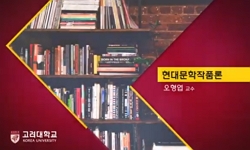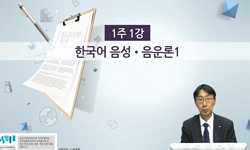This study is an attempt to reconsider the exceptionality and universality of Cho Ji-hoon’s poems after confirming the classic thought system contained in the poems oof Woljeongsa in 1941, which Cho Ji-hoon himself called ‘The Natural Poetry of De...
http://chineseinput.net/에서 pinyin(병음)방식으로 중국어를 변환할 수 있습니다.
변환된 중국어를 복사하여 사용하시면 됩니다.
- 中文 을 입력하시려면 zhongwen을 입력하시고 space를누르시면됩니다.
- 北京 을 입력하시려면 beijing을 입력하시고 space를 누르시면 됩니다.

조지훈 시의 예외성과 보편성 ―월정사 시편을 중심으로― = A Study on the Exceptionality and Universality of Cho Ji-hoon’s Poetry ―Focusing on Woljeongsa Poems―
한글로보기https://www.riss.kr/link?id=A107319985
- 저자
- 발행기관
- 학술지명
- 권호사항
-
발행연도
2021
-
작성언어
-
-
주제어
조지훈 ; 서정시 ; 서경의 자연시 ; 월정사 시편 ; 예외성 ; 보편성 ; Cho Ji-hoon ; Lyric poem ; The Natural Poetry of Description ; The poems of Woljeongsa ; Exceptionality ; Universality
-
KDC
900
-
등재정보
KCI등재
-
자료형태
학술저널
-
수록면
13-37(25쪽)
-
KCI 피인용횟수
0
- DOI식별코드
- 제공처
-
0
상세조회 -
0
다운로드
부가정보
다국어 초록 (Multilingual Abstract)
Cho Ji-hoon recalled the poems of Woljeongsa as his poetic hometown. It seems appropriate to understand the meaning of hometown as an archetype that cannot be returned after leaving once, rather than an archetype that can be found anywhere in his poem. The poem of Woljeongsa was an exception rather than a typical one for him. He wandered through the times like a ‘traveler’, and expressed the sensibility arising from responding to historical events in various forms of poetry. Here is the point where I hope that his later poems, which have been neglected so far, will be reconsidered through this study. this study will suggest a perspective that can grasp his later poetry not as a ‘hobby’ written by scholars and intellectuals, but as a consistently appearing hot ‘variation of emotion’.
This study is an attempt to reconsider the exceptionality and universality of Cho Ji-hoon’s poems after confirming the classic thought system contained in the poems oof Woljeongsa in 1941, which Cho Ji-hoon himself called ‘The Natural Poetry of Description.’ The subject matter of the poems created during his stay at Woljeongsa is mostly natural objects reflecting the circular world of the East. The speaker controlled the exposure of inner emotions and showed contemplation of the nature of the circular world. Previously, he showed feelings of grief by paying attention to the subject matter of traditional culture during the Japanese colonial rule, where political speech was prohibited. Afterwards, he expressed his poetry, historical consciousness and critical sensibility related to common events in modern Korean history such as the Korean War in 1950, the corruption politics of the Liberal Party, and April 19 in 1960.
Cho Ji-hoon recalled the poems of Woljeongsa as his poetic hometown. It seems appropriate to understand the meaning of hometown as an archetype that cannot be returned after leaving once, rather than an archetype that can be found anywhere in his poem. The poem of Woljeongsa was an exception rather than a typical one for him. He wandered through the times like a ‘traveler’, and expressed the sensibility arising from responding to historical events in various forms of poetry. Here is the point where I hope that his later poems, which have been neglected so far, will be reconsidered through this study. this study will suggest a perspective that can grasp his later poetry not as a ‘hobby’ written by scholars and intellectuals, but as a consistently appearing hot ‘variation of emotion’.
참고문헌 (Reference)
1 김종훈, "한국 근대 서정시의 기원과 형성" 서정시학 2010
2 최동호, "하나의 도에 이르는 시학" 고려대학교 출판부 1997
3 조지훈, "풀잎단장(斷章)" 창조사 1952
4 박목월, "청록집(靑鹿集)" 을유문화사 1946
5 하상일, "조지훈의 비평의식과 서정시론 연구" 한국문학이론과비평학회 11 (11): 85-103, 2007
6 김문주, "조지훈의 ‘서경시’에 함축된 시적 전통의 성격" 한국문학이론과비평학회 11 (11): 9-29, 2007
7 이형대, "조지훈연구2" 고려대학교 출판문화원 2020
8 조지훈, "조지훈시선(趙芝薰詩選)" 정음사 1956
9 조지훈, "조지훈 전집 1-9" 나남출판사 1996
10 김종훈, "조지훈 육필시고 『지훈시초(芝薰詩鈔)』 연구" 민족어문학회 (90) : 39-66, 2020
1 김종훈, "한국 근대 서정시의 기원과 형성" 서정시학 2010
2 최동호, "하나의 도에 이르는 시학" 고려대학교 출판부 1997
3 조지훈, "풀잎단장(斷章)" 창조사 1952
4 박목월, "청록집(靑鹿集)" 을유문화사 1946
5 하상일, "조지훈의 비평의식과 서정시론 연구" 한국문학이론과비평학회 11 (11): 85-103, 2007
6 김문주, "조지훈의 ‘서경시’에 함축된 시적 전통의 성격" 한국문학이론과비평학회 11 (11): 9-29, 2007
7 이형대, "조지훈연구2" 고려대학교 출판문화원 2020
8 조지훈, "조지훈시선(趙芝薰詩選)" 정음사 1956
9 조지훈, "조지훈 전집 1-9" 나남출판사 1996
10 김종훈, "조지훈 육필시고 『지훈시초(芝薰詩鈔)』 연구" 민족어문학회 (90) : 39-66, 2020
11 송기한, "조지훈 시의 유랑 의식 연구" 한중인문학회 (23) : 19-39, 2008
12 이숭원, "조지훈" 새미 2003
13 조지훈, "역사(歷史)앞에서" 신구문화사 1959
14 조지훈, "여운(餘韻)" 일조각 1964
15 김종길, "시에 대하여" 민음사 1986
16 "문장(文章), 1940.2"
17 "문장(文章), 1939.9"
18 "문장(文章), 1939.4"
19 유성호, "근대의 심층과 한국 시의 미학" 태학사 2020
동일학술지(권/호) 다른 논문
-
- 고려대학교 민족문화연구원
- 김건우 ( Kim Kun-woo )
- 2021
- KCI등재
-
조지훈과 혜화전문학교 ―식민지 고등교육 이원 구조와 조선학 학술장을 중심으로―
- 고려대학교 민족문화연구원
- 송현지 ( Song Hyun-ji )
- 2021
- KCI등재
-
- 고려대학교 민족문화연구원
- 고지혜 ( Ko Ji-hye )
- 2021
- KCI등재
-
- 고려대학교 민족문화연구원
- 조형열 ( Cho Hyong-yerl )
- 2021
- KCI등재
분석정보
인용정보 인용지수 설명보기
학술지 이력
| 연월일 | 이력구분 | 이력상세 | 등재구분 |
|---|---|---|---|
| 2026 | 평가예정 | 재인증평가 신청대상 (재인증) | |
| 2020-01-01 | 평가 | 등재학술지 유지 (재인증) |  |
| 2017-01-01 | 평가 | 등재학술지 유지 (계속평가) |  |
| 2015-03-17 | 학술지명변경 | 외국어명 : 미등록 -> Korean Cultural Studies |  |
| 2013-01-01 | 평가 | 등재 1차 FAIL (등재유지) |  |
| 2010-01-01 | 평가 | 등재학술지 유지 (등재유지) |  |
| 2009-06-18 | 학회명변경 | 영문명 : Institute of Korean Culture -> Research Institute of Korean Studies |  |
| 2008-01-01 | 평가 | 등재학술지 유지 (등재유지) |  |
| 2005-10-18 | 학술지명변경 | 한글명 : 민족문화연구 29호 -> 민족문화연구 |  |
| 2005-01-01 | 평가 | 등재학술지 선정 (등재후보2차) |  |
| 2004-01-01 | 평가 | 등재후보 1차 PASS (등재후보1차) |  |
| 2002-01-01 | 평가 | 등재후보학술지 선정 (신규평가) |  |
학술지 인용정보
| 기준연도 | WOS-KCI 통합IF(2년) | KCIF(2년) | KCIF(3년) |
|---|---|---|---|
| 2016 | 0.77 | 0.77 | 0.7 |
| KCIF(4년) | KCIF(5년) | 중심성지수(3년) | 즉시성지수 |
| 0.71 | 0.7 | 1.385 | 0.15 |




 KCI
KCI KISS
KISS






